The lives of international medical students in Bangladesh
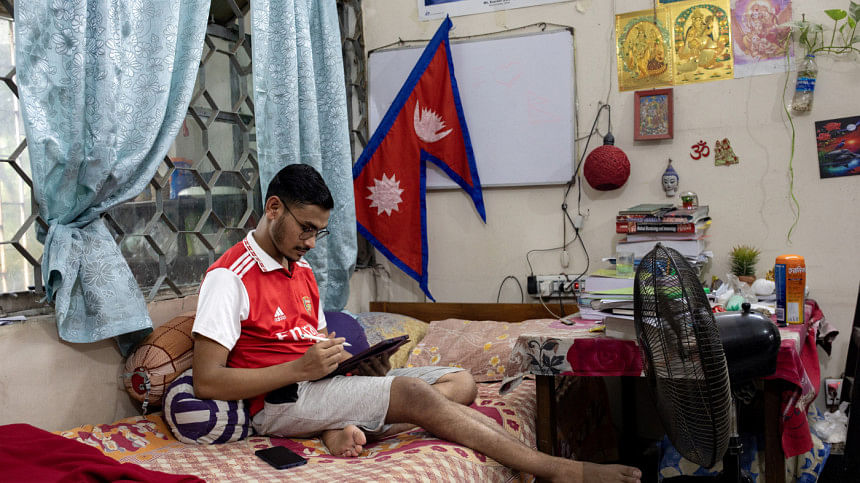
Many of us have thought of pursuing a degree abroad. If we were to set aside the practical aspects of this process and instead shift our focus on to the emotional toll that it takes on a student, we would notice phases of excitement mixed with dashes of fear and anxiety. Excitement because the student would get to experience a whole new country – all on their own – possibly for the first time in their life. Fear precisely because they would be in a whole new country, all alone, thousands of miles away from their loved ones. It could be one of the most unique experiences in a student's life. Now imagine if the country the student is flying into was Bangladesh.
Many of the universities in Bangladesh have foreign students studying a range of subjects. But by far, the degree most foreign students come to pursue is a Bachelor of Medicine and Bachelor of Surgery (MBBS). Currently, 221 out of 5380 seats are reserved for foreign students in government colleges. In private colleges, a large fraction of the intake can be foreign students. Currently, there are over 10,000 medical students only from India. Students from Pakistan, Nepal, Jammu and Kashmir, and even Palestine come to study MBBS here. To get an overview of their experiences, Campus reached out to a few international students and had them discuss numerous aspects of their lives in Bangladesh.
"Everything about leaving your country and your comfort zone and moving to a different part of the world is challenging. A big challenge is adjusting to the environment and culture," said Isaaq N Namoura, A fifth-year student from Palestine studying at Shaheed Suhrawardy Medical College.
"There's a language barrier present here. When I started off, I didn't know that classes would be in Bangla. I didn't get to take a Bangla course when I first came over. English was challenging too as it isn't my first language, and neither is it for my teachers'. So, we struggled to communicate a lot in the beginning. Now that I've learned Bangla though, conversing has become much easier. However, the curriculum should definitely include an introductory course in Bangla," he added.
Another student from Assam, Angela Shirin, studying at Holy Family Red Crescent Medical College said, "MBBS is tough, and being away from home, especially when you see your mates going home every weekend, is super hard. For instance, if I get homesick right now, I need to cross an entire country to go home. And the hardest part is you never know if things at home are going to be the same as when you left. The constant fear and worry about my family take a toll on me. Among the challenges I've had to overcome and adapt to, the climate ranks number one. It's way too hot and humid out here. The language barrier had been a problem, but with time I got a handle on it. All you need to do is learn these words: mama, baam pashe, daan pashe, shomosshha nai."
When asked about her clinical experience and interacting with patients, she said, "I remember a humorous interaction where I was asked to palpate the liver of a middle-aged man. I struggled to ask him to move his shirt aside. I blurted out something close in Bangla, but the patient didn't quite understand what I was trying to say. He proceeded to reply in a different dialect perhaps, but I couldn't grasp it. So, I acted out what I wanted him to do, which was when he finally understood."
"I think the Bangla word for lung is very funny. I chuckle a bit every time I come across a patient with some lung pathology," she added.
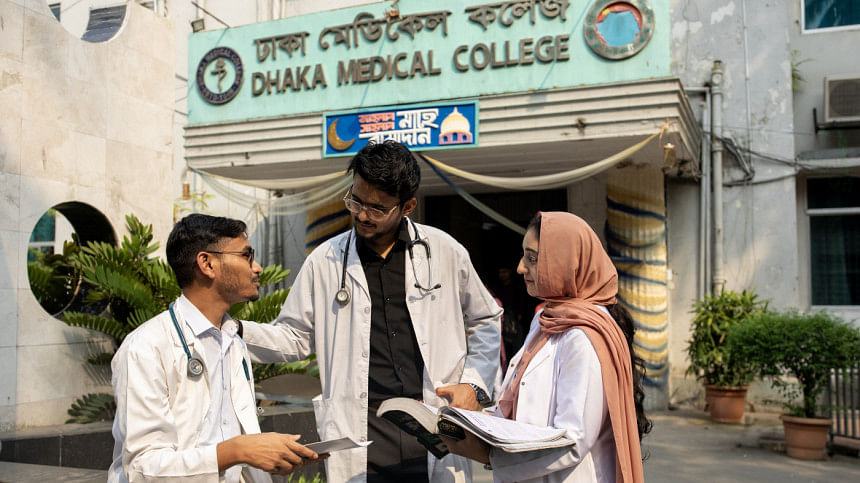
Having a social life, making friends, or finding job opportunities for some extra cash is made difficult not only by the language barrier but by the cultural barrier as well. Settling into hostel culture and interacting with locals poses its own set of challenges.
Regarding this, Isaaq said, "The whole new experience, the whole new set of regulations, culture, and people is exciting to me. The other thing I didn't even realise is I'd enjoy electricity and running water 24/7. This isn't a privilege we always have in Palestine. So, it really provides some much-needed perspective."
Naveed Shahrier, a final-year student from Kashmir said, "Managing your social life is something that isn't addressed enough. It starts with your hostel roommates and batch mates. Often, what begins as congenial friendships grow colder over time. Most of the time, you feel a burden of loneliness. It's a situation that cannot be easily communicated to someone who hasn't experienced being in a foreign land."
He also spoke about the availability of job opportunities for foreign students, "If you see a Kashmiri in the streets of Dhaka, he's either a shawl vendor selling our renowned shawls or a medical student studying in a private medical college. For pocket money, a few foreign students have found a niche as social media influencers. It's apparently a good source of income. One of my juniors, Abhishek Jajariya, a Rajasthani third-year student, has been doing inspirational work. He's cashing in six figures a month providing online tutoring to junior students and acting as a consultant. Besides this, many students vlog about their experience here and get endorsement deals. Many Kashmiris are also sought by modelling agencies to pose for local brands."
As for the quality of education and cooperation from faculty members, Angela remarked that faculty members from her college have been friendly and considerate. "They always consider granting us additional leave, empathise with us, and also understand the difficulties of living so far from home for long stretches," she said.
Looking back at the tumultuous times of the July uprising in 2024, she explained, "I was really touched (by the faculty members' conduct) when chaos built up in Bangladesh last year. All colleges were shut down and we were stuck here. A few of the teachers were really concerned and made sure we got home safely. In addition, we addressed our concerns about not resuming classes right away."
"Not only were they considerate enough to postpone the items (daily viva exams) till we arrived but also assured us that we could take the exams online or when we came back to Bangladesh, if we missed it. I have always openly shared my problems, be it personal or academic, with some of the teachers, and they have always been helpful," she said.
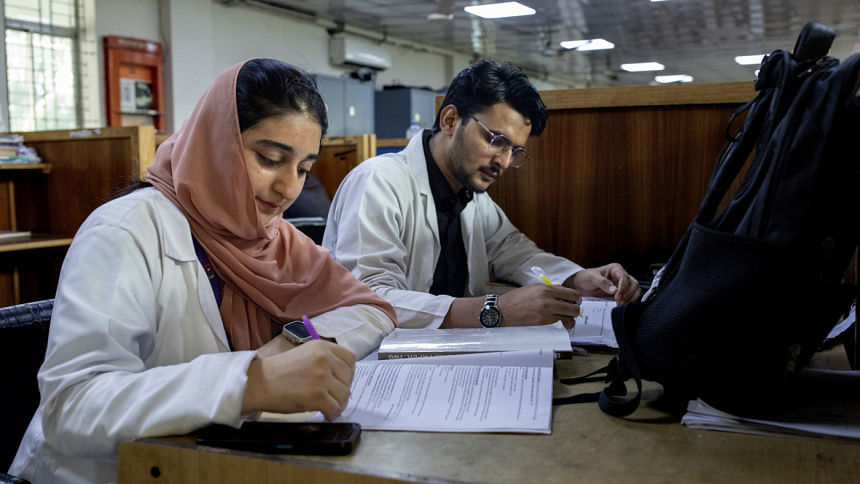
Although Bangladesh welcomes a considerable number of medical students every year, there still remains a lot to account for if we truly want to be a hub for medical education. The Directorate General for Health Services (DGHS), for instance, could take steps to improve the experience of foreign students pursuing an MBBS degree in Bangladesh.
Munna Yadav, a student from Nepal at Dhaka Medical College said, "Bangladesh is a prime destination for medical education, as there is good clinical exposure here with high patient flow. Yet some hurdles persist. Foreign students doing internships at government medical colleges do not receive any compensation. Some private colleges do pay, but there is a lack of uniformity there as well."
"Besides, private medical colleges don't provide enough information about their institutions online or in circulars, which makes the process of direct admission tough. It also forces many to rely on consultancies. The country often goes through spells of political turmoil but there is no government body or special unit from the DGHS to counsel or reassure foreign students about their safety. These issues are holding this sector back and need to be addressed," he elaborated.
Prof. Md Mustafizur Rahman, former Vice-Principal of Shaheed Suhrawardy Medical College, stated that Bangladesh is a hub for medical education in South Asia due to the quality of education being offered, exposure to a broad spectrum of clinical cases, and the low cost at which the education is being offered. However, there is still room for improvement.
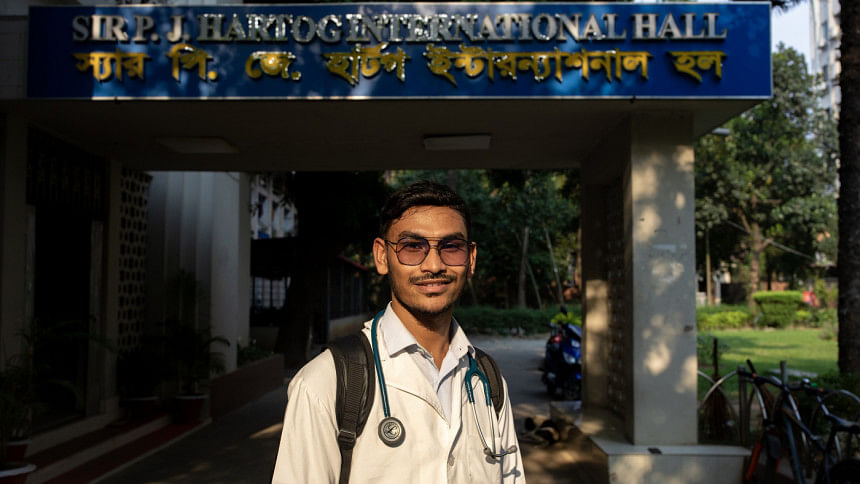
"Our faculty members are very conscious about the needs of international students, even more so than our domestic students sometimes because we acknowledge international students may have a hard time fitting in here and naturally may require closer attention and care. Yes, we have space for improvement when it comes to accommodation and one-stop services for these students. We hope by incorporating these facilities in the future, Bangladesh will secure its place as an ideal destination for medical education," he said.
As things stand, we are offering quality medical education at a competitive price compared to the global market. However, a unified and transparent approach to the admission process for foreign nationals, which would be applicable to all medical colleges, is of utmost necessity. Special counsellors also have to be assigned by the DGHS for any emergency needs the students may have. And though the medium of education will remain in English, incorporating an introductory Bangla language course for foreign students will go a long way in helping them interact with patients better.
The place where one completes their undergraduate becomes a second home of sorts. With that in mind, it should be our holistic goal to provide these individuals – who have left their homelands to study in our medical colleges – a standardised academic experience as well as an amiable social experience. It is our hope that if they return to their homelands, they will remember their alma mater with fondness and Bangladesh as a second home.
Mehrab Jamee is a fifth-year student at Mugda Medical College, and writes to keep himself sane. Reach him at [email protected]

 For all latest news, follow The Daily Star's Google News channel.
For all latest news, follow The Daily Star's Google News channel. 





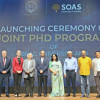
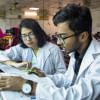



Comments